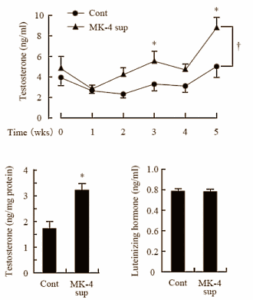There are two forms of vitamin K: plant-based vitamin K1 [phylloquinone], found in green vegetables such as peas, broccoli, and spinach, and animal K2 [menaquinone]. The difference between the two forms is the “tail” of the prenyl units: K2 has one, while K1 has none.
“Tails” also differ: meat and eggs have a tail with four extra prenyl units [MK-4], and cheese and quark contain different versions of vitamin K2 with seven, eight, and nine prenyl units [MK-7, MK-8, and MK-9 ].
Fermented foods such as natto contain vitamin K2 with seven prenyl units.
We need vitamin K for vital enzymes to function. These include the enzymes that synthesize blood clotting factors and others that fix calcium in the bones, but vitamin K probably has many more functions.
Japanese studies aimed to learn more about these unknown functions of vitamin K2: “Vitamin K is essential for post-translational modification of various Gla proteins. Although it is widely distributed in several organs, including the testis, the function of vitamin K in these organs is not well characterized. In this study, we investigated the function of vitamin K in the testis and analyzed its role in steroidogenesis.”
The scientists decided to give one group of laboratory animals a low vitamin K2 (MK-4) diet of 0.75 mg per kg and another group a high vitamin K2 (MK-4) diet of 75 mg per kg. The experiment lasted five weeks.
In the group that received large amounts of vitamin K2 (MK-4), the animals’ blood testosterone levels and their testicular testosterone concentration increased as the experiment progressed. Both were compare the d to baseline and contgroupsroup. At the same time, the vitamin did not affect the level of LH, the pituitary hormone that stimulates the production of testosterone in the testicles.

A diet high in vitamin K caused an increase in the activity of PKA and CREB enzymes in the testicles. This, in turn, probably caused an increase in the activity of the CYP11A enzyme. And this enzyme is important for the synthesis of testosterone. When the researchers repeated their experiment with vitamin K1, they saw almost no testosterone-boosting effect.
A diet high in vitamin K2 (MK-4) “may help reduce the risk of age-related disease by increasing testicular testosterone production,” the researchers write.

